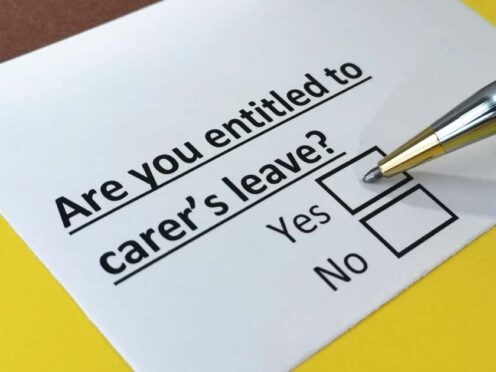
A legal entitlement to unpaid leave for carers has been hailed as a “huge step forward for millions” as it comes into effect.
Carers UK said the new law will apply to more than two million workers in England, Wales and Scotland who have unpaid caring responsibilities.
The charity said its past research had found that around 600 people a day give up work so they can care due to a lack of flexibility and support.
Under the Carer’s Leave Act, which comes into force on Saturday, employees who are carers can take up to a week of unpaid leave every 12 months – equating to five days for most people.
Workers are entitled to such leave to give or arrange care for a dependant – not necessarily a family member – who has a physical or mental illness or injury meaning they will need care for more than three months, who has a disability, or who needs care due to old age.
Wendy Chamberlain, who introduced the Bill to Parliament in 2022, described the new entitlement as “vital progress in improving carers’ employment rights” and something which will give people more flexibility to balance work and caring.
The Liberal Democrat MP said: “Caring or being cared for is something that almost everyone will experience at some point in their life.
“The work unpaid carers do is so vital yet is it extremely underappreciated. This hard work should be better recognised which is a key reason why I led the Carer’s Leave Act through Parliament.”
Helen Walker, chief executive of Carers UK, said: “The Carer’s Leave Act coming into force is a huge step forward for millions of carers, which recognises the vital importance of their caring role and empowers them to ask for support in the workplace – in the form of unpaid Carer’s Leave – knowing that they have a legal entitlement to this.”
I am over the moon to see my Carer’s Leave Bill pass its final hurdle. It will become law and take effect next year, with millions of unpaid carers across the country gaining a new employment right for the first time. https://t.co/NZzlTb2CFV
— Wendy Chamberlain MP (@wendychambLD) May 19, 2023
She said “too many skilled and valued workers are leaving employment due to the stress of balancing work and unpaid care” but now the Act means every employer in the country “must recognise carers in the workplace”.
She said employees can be “confident speaking about their caring role – kickstarting a crucial conversation about the support they need to stay in work, which matters not just for carers, but for employers and the economy, too”.
Business minister Kevin Hollinrake said: “The role of a carer effectively means some have to work two jobs with the stress of juggling work with caring for a disabled or elderly relative.
“These new laws will enable a better balance of caring responsibilities with work commitments, supporting people to remain in employment and building on the UK’s flexible and dynamic labour market.”
Meanwhile, polling has suggested only around one in 10 unpaid carers surveyed across England feel they have a “good understanding” of the Act.
Of 1,000 unpaid carers, just over half (56%) said they believed the current Government was supporting unpaid carers “ineffectively”, while 65% of those polled said that they would be “likely” to switch their vote to a party which would bring in more measures to support their needs.
The polling, commissioned by GoodOaks Homecare, “is not a cheerful and optimistic read, and there are findings which will make politicians of all parties uneasy”, said Conservative MP Damian Green in his role as chair of the All-Party Parliamentary Group (APPG) on adult social care.
In a foreword for a report accompanying the polling, he highlighted conclusions that carers “are not happy with the level of the Carer’s Allowance, and they want the entitlement to some respite leave”, as well as “more support for their own health and wellbeing, which are too often sacrificed in the interests of those who need the care”.

The February polling, for the company’s You Are Not Alone campaign, found that 62% of unpaid carers described themselves as having felt “stressed”, while unpaid carers were more than twice as likely as members of the general public to have said they felt lonely.
Campaign founder Ben Ashton said the findings “shed light on the immense challenges faced by those dedicating their lives to care for others, often at great personal cost” and should “serve as a wake-up call to our nation’s leaders”.
He added: “The Carer’s Leave Act is a step forward, but our research underscores a significant gap in awareness and support.”
Under the Act, a week means the length of time someone usually works over seven days, so if someone works a five-day week they can take five days of carer’s leave either in one go, as individual days or half days throughout the year.
Carers NI said carers in Northern Ireland were being “left behind”.
Craig Harrison, public affairs manager at the organisation, said: “Having no government in Stormont for two years has meant that local carers are now being left behind and missing out on a crucial new employment right that’s coming into force in GB.”

Enjoy the convenience of having The Sunday Post delivered as a digital ePaper straight to your smartphone, tablet or computer.
Subscribe for only £5.49 a month and enjoy all the benefits of the printed paper as a digital replica.
Subscribe